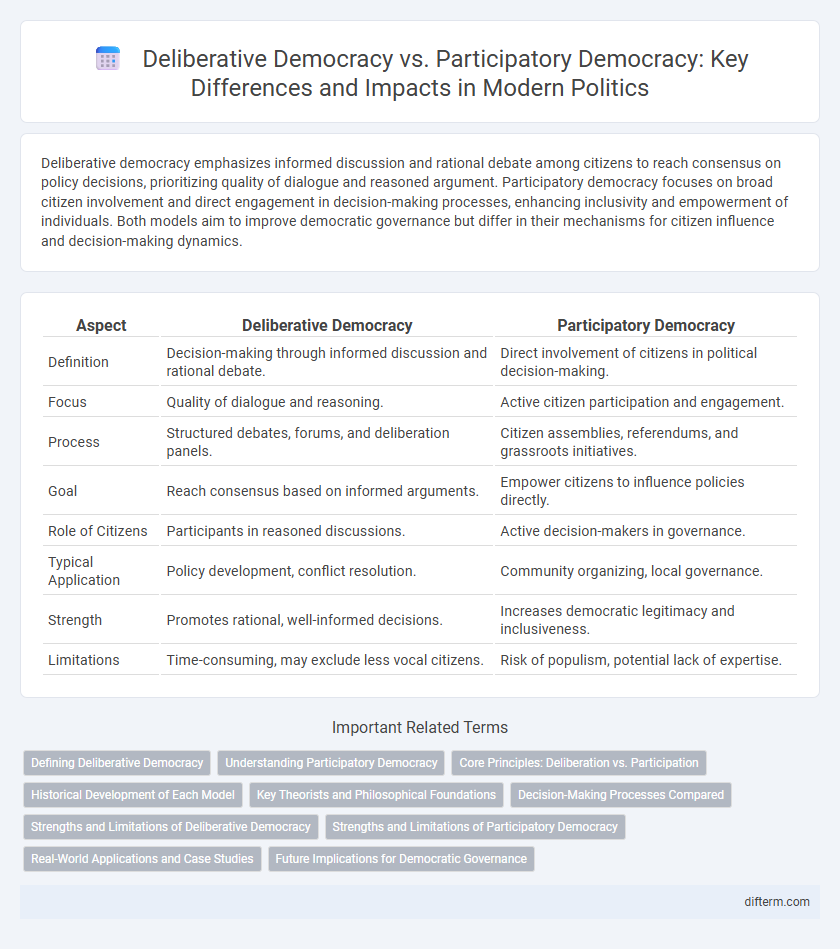Deliberative democracy emphasizes informed discussion and rational debate among citizens to reach consensus on policy decisions, prioritizing quality of dialogue and reasoned argument. Participatory democracy focuses on broad citizen involvement and direct engagement in decision-making processes, enhancing inclusivity and empowerment of individuals. Both models aim to improve democratic governance but differ in their mechanisms for citizen influence and decision-making dynamics.
Table of Comparison
| Aspect | Deliberative Democracy | Participatory Democracy |
|---|---|---|
| Definition | Decision-making through informed discussion and rational debate. | Direct involvement of citizens in political decision-making. |
| Focus | Quality of dialogue and reasoning. | Active citizen participation and engagement. |
| Process | Structured debates, forums, and deliberation panels. | Citizen assemblies, referendums, and grassroots initiatives. |
| Goal | Reach consensus based on informed arguments. | Empower citizens to influence policies directly. |
| Role of Citizens | Participants in reasoned discussions. | Active decision-makers in governance. |
| Typical Application | Policy development, conflict resolution. | Community organizing, local governance. |
| Strength | Promotes rational, well-informed decisions. | Increases democratic legitimacy and inclusiveness. |
| Limitations | Time-consuming, may exclude less vocal citizens. | Risk of populism, potential lack of expertise. |
Defining Deliberative Democracy
Deliberative democracy emphasizes informed, reflective discussion where citizens engage in reasoned debate to reach consensus or well-justified decisions. It prioritizes the quality of dialogue, inclusiveness, and the exchange of diverse perspectives to improve collective decision-making. This approach contrasts participatory democracy's broader citizen engagement by focusing specifically on deliberation as a mechanism for legitimacy and rational outcomes.
Understanding Participatory Democracy
Participatory democracy emphasizes direct involvement of citizens in decision-making processes, enhancing political engagement beyond just voting. It fosters empowerment by encouraging active dialogue, collective problem-solving, and community deliberation at local and national levels. This model contrasts with deliberative democracy's focus on structured debate among elected representatives or experts, offering a more grassroots approach to governance.
Core Principles: Deliberation vs. Participation
Deliberative democracy centers on reasoned discussion and informed debate among citizens, emphasizing collective decision-making through thoughtful evaluation of arguments. Participatory democracy prioritizes direct involvement and active engagement of individuals in the political process, valuing widespread participation over the depth of discourse. Core principles of deliberation include dialogue quality, critical reflection, and consensus-building, whereas participation underscores inclusivity, accessibility, and empowerment of diverse voices.
Historical Development of Each Model
Deliberative democracy traces its roots to ancient Athenian assemblies and was revitalized in the late 20th century through philosophers like Jurgen Habermas, emphasizing reasoned debate and consensus-building among citizens. Participatory democracy emerged from 19th-century social movements and was popularized during the 1960s civil rights era, advocating direct citizen involvement in decision-making processes beyond voting. Both models reflect evolving responses to democratic engagement, with deliberative democracy stressing structured discussion and participatory democracy prioritizing active citizen participation at grassroots levels.
Key Theorists and Philosophical Foundations
Deliberative democracy, championed by theorists like Jurgen Habermas and John Rawls, emphasizes reasoned argumentation and public justification rooted in communicative rationality and the "public sphere." Participatory democracy, advocated by Carole Pateman and Benjamin Barber, prioritizes direct citizen engagement and empowerment, based on the philosophical foundations of democratic equality and active political agency. Both models draw from classical democratic theory but diverge on the role of discourse and participation in legitimizing political decisions.
Decision-Making Processes Compared
Deliberative democracy emphasizes structured, reasoned discussion among diverse participants to reach consensus, prioritizing informed debate and mutual understanding. Participatory democracy focuses on broad, direct involvement of citizens in decision-making, ensuring inclusiveness and empowerment in political processes. Both models seek to enhance democratic legitimacy but differ in the mechanisms and extent of public engagement during policy formulation.
Strengths and Limitations of Deliberative Democracy
Deliberative democracy excels in fostering informed decision-making through structured dialogue and critical reflection among diverse participants, enhancing the legitimacy and quality of policies. Its strength lies in promoting reasoned consensus and reducing polarization by encouraging mutual understanding, although it often faces limitations such as potential exclusion of marginalized voices due to access barriers and the risk of deliberation being dominated by more articulate or powerful individuals. The process can also be time-consuming and resource-intensive, making it challenging to scale or implement in large, complex political systems.
Strengths and Limitations of Participatory Democracy
Participatory democracy excels in empowering citizens through direct involvement in decision-making processes, enhancing political engagement and fostering a deeper sense of community ownership. Its limitations include the potential for unequal participation, where marginalized groups may still face barriers to influence, and the challenge of scaling direct involvement in large, complex societies. Despite these drawbacks, participatory democracy promotes transparency and accountability by encouraging continuous citizen input beyond periodic elections.
Real-World Applications and Case Studies
Deliberative democracy thrives in contexts like citizen assemblies in Ireland, where structured dialogue leads to informed policy decisions on issues such as abortion laws. Participatory democracy is exemplified by Brazil's participatory budgeting, enabling direct citizen influence on local government spending and enhancing community engagement. Both models demonstrate tangible impacts on governance through real-world applications, with deliberative processes emphasizing reasoned debate and participatory approaches fostering broader inclusivity.
Future Implications for Democratic Governance
Deliberative democracy enhances informed decision-making through structured dialogue, promoting legitimacy and public trust essential for future democratic governance. Participatory democracy increases citizen engagement and empowerment, fostering broader inclusivity and responsiveness in policy development. Integrating both models can address contemporary challenges by balancing expert input with grassroots involvement, ensuring resilient and adaptive democratic institutions.
deliberative democracy vs participatory democracy Infographic

 difterm.com
difterm.com